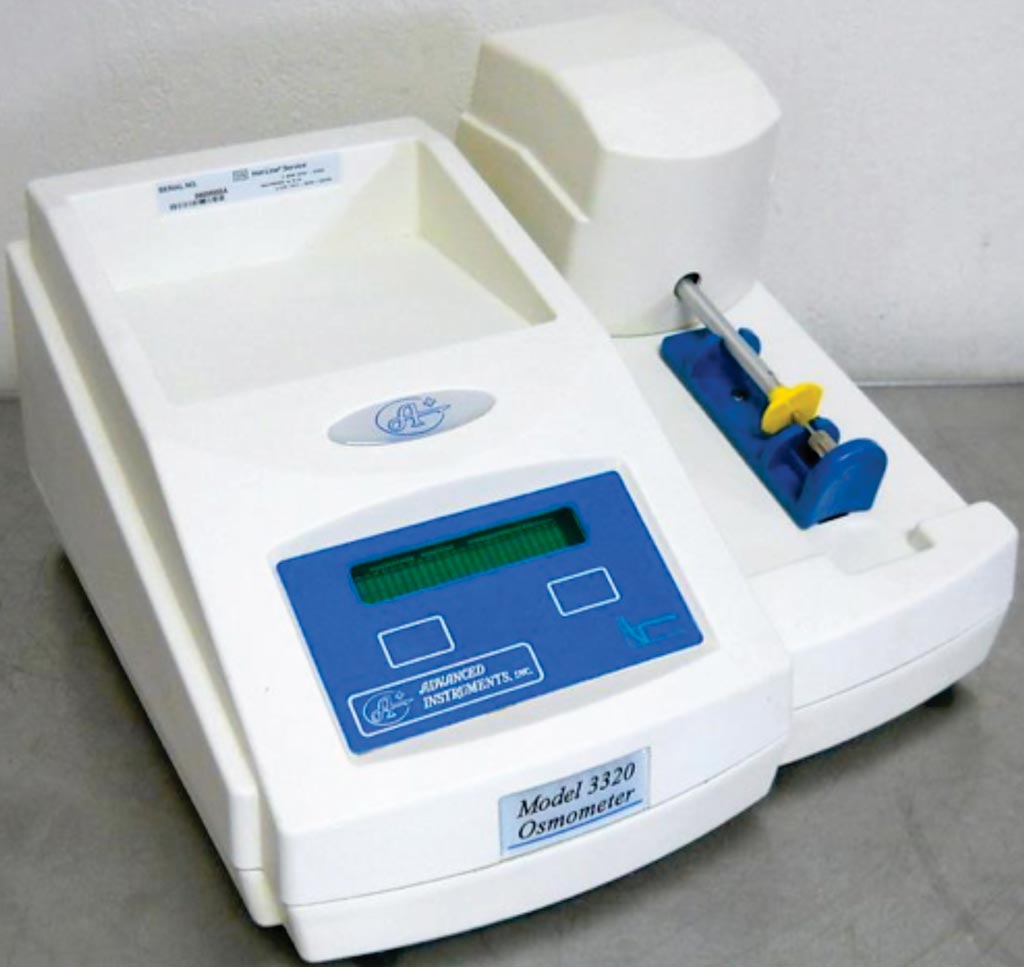Urinary Hydration Markers Tested for Storage Condition Validity
By LabMedica International staff writers
Posted on 27 Aug 2019
Fluid balance is an aspect of the homeostasis of organisms in which the amount of water in the organism needs to be controlled, via osmoregulation and behavior, such that the concentrations of electrolytes in the various body fluids are kept within healthy ranges.Posted on 27 Aug 2019
The human kidneys will normally adjust to varying levels of water intake. The kidneys will require time to adjust to the new water intake level. This can cause someone who drinks a lot of water to become dehydrated more easily than someone who routinely drinks less. Analysis of urine specimens is widely utilized to determine day-to-day hydration status in individuals as well as for other markers of health.

Image: The 3320 osmometer used to assess urine osmolality, a measure of urine concentration and hydration (Photo courtesy of Advanced Instruments).
Scientists at the University of North Carolina at Greensboro (Greensboro, NC, USA) enrolled eight males and 13 females (mean ± SD; age, 24 ± 5 years; body mass, 68.9 ± 24.2 kg; height, 160.2 ± 32.1 cm) without a history of renal disease or currently taking any medications or supplements known to affect the accuracy of urinary hydration markers. Participants provided a 24 hour urine sample in a clean container with each urine sample being separate into four separate containers, two in each of the following temperatures: 7 °C and 22 °C. One specimen container at each temperature was either sealed using the manufacturers cap (single sealed, SS) or the manufacturers cap plus laboratory wrapping film (double sealed, DS).
Each sample was analyzed after 1, 2, 3, 7 and 10 days. Urine samples were assessed for urine osmolality (UOSMO), urine specific gravity (USG), and urine color (UCOL). UOSMO was stable at 7 °C for two days and three days for single sealed and double sealed containers, respectively. UOSMO was determined via freezing point depression with a 3320 osmometer. USG was measured using an optical refractometer that was accurate to ±0.001 AU and had a resolution of 0.0001. UCOL was measured by comparing each urine sample to an 8-point urine color chart where the sample was held against a white background in a well-lit room.
The team reported that USG measures were stable for singled sealed and double sealed for up to ten days when stored at 22 °C. UCOL measures were maintained for up to three days in all storage methods. For refrigerated samples, UOSMO measures for samples stored in SS containers became significantly elevated three days following baseline measures, whereas UOSMO measures for samples stored in DS containers became significantly elevated seven days following baseline measures. Conversely to UOSMO, USG measures were significantly elevated in SS and DS samples stored at 7 °C beginning one day following baseline measures, compared to SS and DS samples stored at 20 °C.
The authors concluded that to achieve optimal results, it is recommended that 24-hour urine samples are assessed immediately for the respective hydration markers being analyzed. If immediate analysis is unavailable, such as in the case of field based or longitudinal research, it is recommended that 24-hour urine samples are stored in a refrigerated environment and hydration markers (UOSMO and UCOL) be assessed within 48 hours. The study was published on August 5, 2019, in the journal PLOS ONE.
Related Links:
University of North Carolina at Greensboro













